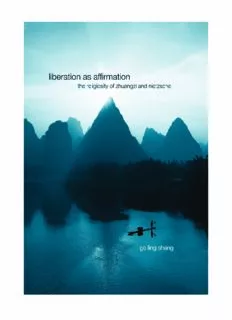Table Of ContentLiberation as Affirmation
SUNY series in
Chinese Philosophy and Culture
Roger T. Ames, editor
LIBERATION AS AFFIRMATION
The Religiosity of Zhuangzi and Nietzsche
Ge Ling Shang
State University of New York Press
Published by
State University of New York Press, Albany
© 2006 State University of New York
All rights reserved
Printed in the United States of America
No part of this book may be used or reproduced in any manner whatso-
ever without written permission. No part of this book may be stored in a
retrieval system or transmitted in any form or by any means including
electronic, electrostatic, magnetic tape, mechanical, photocopying, recording,
or otherwise without the prior permission in writing of the publisher.
For information, address
State University of New York Press,
194 Washington Avenue, Suite 305 Albany, NY 12210
Production by Kelli Williams
Marketing by Susan M. Petrie
Library of Congress Cataloging-in-Publication Data
Shang, Geling.
Liberation as affirmation: the religiosity of Zhuangzi and Nietzsche / Ge
Ling Shang.
p. cm. — (SUNY series in Chinese philosophy and culture)
Includes bibliographical references and index.
ISBN 0-7914-6667-1 (hardcover : alk. paper)
1. Philosophy, Taoist. 2. Philosophy. 3. Philosophy, Comparative.
4. Zhuangzi. 5. Nietzsche, Friedrich Wilhelm, 1844–1900. I.Title.
II. Series.
BL1920.S45 2006
181(cid:98).114—dc22
2005007995
10 9 8 7 6 5 4 3 2 1
To My Father Shang Xü
CONTENTS
Acknowledgments ix
Chapter 1. Introduction 1
Reinterpreting Zhuangzi and Nietzsche 2
Perspective on Comparative Philosophy 4
Method and Plan 5
Chapter 2. Zhuangzi’s Dao: A Way of Freedom 9
The Concept of Dao in Early Chinese History 11
Wuwu: A Deconstruction of Metaphysical Perspectives of Dao 15
Dao Throughs as One 23
Wuzhi: Equalizing Opinions is the Way of True Knowledge 29
Language without Words: Beyond Language and Silence 37
Wuwei or Non-doing: Against the Tradition of Morality 46
Xiao Yao You: A Spiritual Freedom Realized in this World 52
Chapter 3. Nietzsche’s Philosophy of Life Affirmation 59
Nietzsche’s Mission: Revaluation of All Values 60
Genealogy: A New Way of Philosophizing 67
Truth, Knowledge, and Morals 71
Metaphysics as a Symptom of Human Decadence 72
Truths as Lies and Will to Truth as Ascetic Ideal 76
Language and Truth 78
Does Nietzsche Renounce the Existence of Truth? 79
A Genealogical Critique of Morality 80
Overcoming Metaphysics 83
The World of Appearances and the Will to Power 86
Religiosity: Liberation as Life Affirmation 93
vii
viii CONTENTS
Chapter 4. An Interplay between Zhuangzi and Nietzsche 103
Goblet Words and Dionysian Dithyramb 104
Truth, Knowledge, and Interpretation 108
Revaluation and Devaluation: Beyond Good and Evil 113
Nature as Primary Unity 118
True Person and Übermensch: Living in the World 125
Ziran and Freedom: Life Affirmation 131
Further Reflections on Differences Between Zhuangzi and
Nietzsche 134
Chapter 5. Converging New Worlds: Zhuangzi,
Nietzsche, and Contemporary Philosophy 137
Affirmation after Deconstruction: Zhuangzi and Nietzsche
Challenge Postmodern Solutions 138
The Liberation of Thought: Zhuangzi and Nietzsche in
Contemporary China 146
Philosophical Religiosity 153
Notes 165
Selected References 181
Index 189
ACKNOWLEDGMENTS
This book would have been an impossible task for me to accomplish without
the direct and indirect contributions by a great many people to its
production.
I wish to thank late Charles Wei-Hsun Fu, who encouraged me to come
to study in the United States and worked with me on this topic at the outset.
His delicate taste and acute criticism of philosophy, his passionate and exuber-
ant will to love and friendship, and his conscientious study and continuous
search for knowledge kept reminding me how to live and work as a philoso-
pher. Many of the ideas in the book originated from our conversations and
discussions during the years we spent together at Temple University.
Special thanks to Joseph Magolis, Yü Ying-shih, Thomas J. Dean, Sandra
Wawarytko, Lisa Portmess, and Louis J. Hammann whose critical comments
and constructive advice through most parts of my graduate studies are invalu-
able for its further development. I am happy to acknowledge specifically the
help and support I received from Donald Munro, Peimin Ni, and Stephen
Rowe. They read my final manuscript and provided very concrete advice and
serious corrections for its completion. I would like to thank my friends
Weiming Tu, Yanming An, Yong Huang, Zao Zhang, Tania Oldenhage, Kui-de
Chen, Wansheng Huang, Guorong Yang, Xuanmeng Yü, Jianchu Chen, and
Elizabeth Rossmiller for their constant support and stimulating conversations,
which have always been the most precious wells of my inspiration. My special
appreciation goes to Douglas Berger, because almost every step I made and
every pain I went through for this work has to do with his care, patience, and
wisdom.
I am grateful to Harvard-Yenching Institute at Harvard University for a
fellowship (in 1999–2000) which gave me tremendous support both aca-
demically and financially. I would also like to acknowledge the philosophy
department and The Institute of Modern Chinese Thought and Culture at
East China Normal University for giving me the opportunity to teach and
do research in China (2003–2004). It enabled me to exchange ideas with
many Chinese scholars, which benefited my study enormously.
ix
Description:Uses the concept of religiosity to challenge traditional views of Nietzsche and Zhuangzi as nihilistic and anti-religious.

